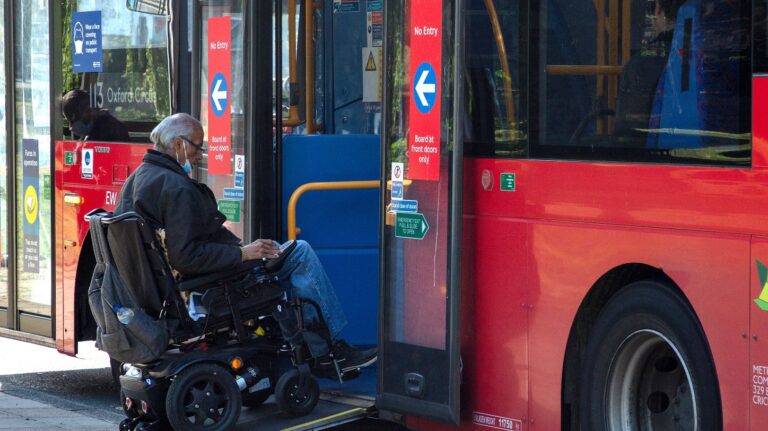Passenger rights charity Bus Users UK has published a new study investigating the lived-experiences of disabled bus passengers across England, Scotland and Wales.
The study, titled ‘Why are we waiting? Disabled people’s experiences of travelling by bus’, used the first hand, personal accounts of 32 disabled passengers to create an understanding of the state of public transportation accessibility in the UK.
The 32 disabled passengers, who were all of different ages and backgrounds, with visible and/or non-visible disabilities, were invited to complete a two-week diary task documenting their recent bus journeys sharing images, videos and reflections.
Participants could conduct either a shadowed or remote journey, accompanied by a researcher observing them in the former or a researcher conducting an in-depth interview with the participant after their journey in the latter.
Bus Users UK outlined the key findings in:
-
Infrastructure: Many bus stops lack essential facilities such as seating or shelter, making it exhausting and painful for some disabled participants to wait for a bus. Obstacles such as heightened kerbs, bins, and bike stands pose difficulties and dangers in accessing and boarding buses.
-
Bus design: Wheelchair spaces often face away from information displays and there can be competition between passengers for space.
-
Information: Inconsistent and outdated timetables, contradictory information on apps and at bus stops, and poor and inaccessible or missing audio and visual information on buses have left passengers stranded or forced them to abandon their journeys.
-
Bus drivers: The behaviour and attitude of bus drivers significantly impacts the journey, and in some cases even the ability, of a disabled person to travel.
-
Passengers: The behaviour and attitude of other passengers can also make or break a journey.
Bus Users UK state that their findings reveal that while buses are essential for enabling people to lead full and independent lives, currently they are not accessible to everyone.
Frontier Economics also conducted quantitative analysis based on existing data from the National Travel Survey and the Department for Transport’s Bus Statistics.
The aim of this quantitative analysis was to complement and provide context for the qualitative insights gathered.
Chief executive of Bus Users UK, Claire Walters, said: “At some point in our lives, we are all likely to need more accessible transport and buses can provide that, offering independence and enabling people to lead active and fulfilling lives.
“However, despite many recent advances in legislation, staff training and vehicle design, buses are still far from fully accessible and this research highlights, in their own words, the many challenges facing disabled passengers.
What we need now is a sustained commitment, collaboration, and funding to ensure that bus travel offers a genuinely reliable, accessible and environmentally friendly option for everyone.”
Achievements and innovations in accessibility and disability will be celebrated at the third annual CiTTi Awards, which will be held on 26 November 2024 at De Vere Grand Connaught Rooms in London. Nominations are open now! Please visit www.cittiawards.co.uk to learn more about this unmissable event for the UK’s transportation sector





